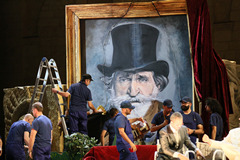| Opera Reviews | 18 April 2024 |
Verdi's early opera gets a makeover in Martina Francaby Silvia Luraghi |
|
| Verdi: Un giorno di regno Festival della Valle D'Itria, Martina Franca 30 July 2017 |
|
|
The opera, which premiered at La Scala in 1840, was so unsuccessful at opening night that further performances were immediately cancelled. The failure could be put down to personal reasons (Verdi had lost his wife earlier that year and their two children had died in the preceding two years) mixed with an obsolete libretto by Felice Romani, which had been sitting in the companies archives for decades waiting to be given a musical score. After that, it took one and half years for Verdi to get back to work and over five decades experience of real life to feel confident enough to return to comedy. The light plot reminds of a comedy of errors, with no especially comical highlights. The main character, King Stanislaus of Poland, was far enough from the audience's acquaintance to be of any interest. The opera had a few revivals during Verdi’s life and even in modern times remains a very rare feature of opera seasons and festivals. In Martina Franca, it marked the Italian debut of soprano Stefania Bonfadelli as opera director. Trying to stage a work with little performance tradition and a plot unknown to many opera goers, Bonfadelli decided to take inspiration from the double title of the opera, and presented a theater in the theater reading. A theater company occupies an abandoned theater trying to revive it and reign in it a for a day by staging a play called The pretended Stanislaus. Thus, members of the theater company also play the roles of the characters of Romani’s original libretto. The main protagonists both of the new and of the original plot is Cavalier Belfiore, the pretended king of the title, who, in the intention of the stage director, is the director of the company. Leading a company of young actors, he runs the casting, and decides to take the protagonists role only after the actor that was auditioning for it proves unable to perform. The leading actress, in the original plot the Marchesa del Poggio, Belfiore’s lover, creates all sorts of problems by trying to always stand on the foreground, while Baron of Kelbar leads the actors as the author of the plot. The action profited much from the vocal and especially the theatrical skills of baritone Vito Priante, who led the cast, partly composed of young singers from the local bel canto academy, and helped make sense of the double plot. The Marchesa del Poggio was Viktorija Miškūnaité, a temperamental soprano with a nicely colored voice. Mezzo Dioklea Hoxha was a youthful Giulietta, the daughter of Baron of Kelbar, sung by bass Pavol Kuban, while tenor Ivan Ayon Rivas as Edoardo di Sanval was a good partner for Giulietta. The Orchestra Internazionale d’Italia was conducted by Sesto Quatrini. The performance was sold out, as for most other performances at this year’s festival, and was broadcast live by the Italian National Radio: so there is hope for a future CD release of this little known title.
|
|
| Text ©
Silvia Luraghi Photo © Festival della Valle D'Itria |

 The ‘melodramma giocoso’ Un giorno di regno, aka Il finto Stanislao, is perhaps Verdi’s most neglected opera. It was commissioned after his quite successful first opera, Oberto Conte di San Bonifacio, and, after a huge fiasco, remained Verdi’s only comedy until his late masterpiece Falstaff.
The ‘melodramma giocoso’ Un giorno di regno, aka Il finto Stanislao, is perhaps Verdi’s most neglected opera. It was commissioned after his quite successful first opera, Oberto Conte di San Bonifacio, and, after a huge fiasco, remained Verdi’s only comedy until his late masterpiece Falstaff. 





